Books
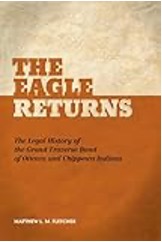 The Eagle Returns: The Legal History of the Grand Traverse Band of Ottawa and Chippewa Indians by Matthew L. M. Fletcher
The Eagle Returns: The Legal History of the Grand Traverse Band of Ottawa and Chippewa Indians by Matthew L. M. Fletcher
An absorbing and comprehensive survey, this legal history shows a group bound by kinship, geography, and language fighting to reestablish their right to self-governance. The Grand Traverse Band has become a well-known national leader in advancing Indian treaty rights, gaming, and land rights, while simultaneously developing a nationally honored Indigenous tribal justice system. This in-depth study explores how federal Indian law and policy drove an Anishinaabe community to the brink of legal extinction, how non-Indian economic and political interests conspired to eradicate the community’s self-sufficiency, and how Indian people fought to preserve their culture, laws, traditions, governance, and language.
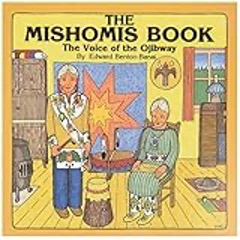 The Mishomis Book: The Voice of the Ojibway by Edward Benton-Banai
The Mishomis Book: The Voice of the Ojibway by Edward Benton-Banai
Written by Ojibway educator and spiritual leader Edward Benton-Banai and first published in 1988, The Mishomis Book draws from the traditional teachings of tribal elders to instruct readers about Ojibway creation stories and legends, the origin and importance of the Ojibway family structure and clan system, the Midewiwin religion, the construction and use of the water drum and sweat lodge, and modern Ojibway history. Intended for readers from all cultures, but especially for Ojibway and Native youth, this book provides an introduction to Ojibway culture and an understanding of the sacred Midewiwin teachings, aiming to protect this knowledge by instilling its importance in a new generation. Encouraging the preservation of a way of life that is centered on respect for all living things, these vibrant stories about life, self, community, and relationship to nature are just as relevant to the modern reader as they were hundreds of years ago.
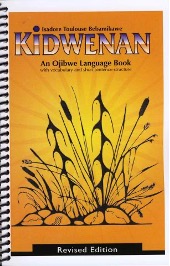 Kidwenan: An Ojibwe Language Book by Isadore Toulouse Bebamikawe
Kidwenan: An Ojibwe Language Book by Isadore Toulouse Bebamikawe
The author, a fluent speaker originally from Wikwemikong on Manitoulin Island, is a graduate from Lakehead University’s Native Language Instructors Program and has taught Anishinaabemowin language classes at NMC. The text is organized into seventeen chapters that contain standard lists of vocabulary and short sentences. Topics include greetings, where are you going, places, table gestures, food, action verbs, feelings, family, numbers, days, months, weather, seasons, and locatives. The words and phrases reflect contemporary lifestyles and include references such as the bank, band office, restaurant, and day care center.
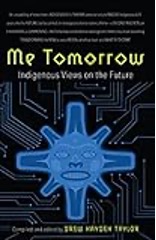 Me Tomorrow: Indigenous Views on the Future compiled and edited by Drew Hayden Taylor
Me Tomorrow: Indigenous Views on the Future compiled and edited by Drew Hayden Taylor
First Nations, Métis and Inuit artists, activists, educators and writers, youth and elders come together to envision Indigenous futures in Canada and around the world. Discussing everything from language renewal to sci-fi, this collection is a powerful and important expression of imagination rooted in social critique, cultural experience, traditional knowledge, activism and the multifaceted experiences of Indigenous people on Turtle Island. Includes essays by: Autumn Peltier, Clarence Louie, Dr. Cyndy Baskin & Minadoo Makwa Baskin, Darrel J. McLeod, Drew Hayden Taylor, Lee Maracle, Dr. Norma Dunning, Raymond Yakeleya, Romeo Saganash, shalan joudry, Shelley Knott Fife, Tae:howęhs aka Amos Key Jr., and Tracie Léost.
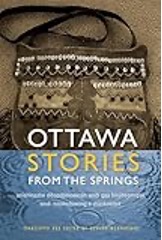 Ottawa Stories from the Springs: Anishinaabe Dibaadjimowinan Wodi Gaa Binjibaamigak Wodi Mookodjiwong e Zhinikaadek translated and edited by Howard Webkamigad
Ottawa Stories from the Springs: Anishinaabe Dibaadjimowinan Wodi Gaa Binjibaamigak Wodi Mookodjiwong e Zhinikaadek translated and edited by Howard Webkamigad
The stories contained in this collection reached Howard Webkamigad nearly eighty years after they were recorded, after first being kept in their original copper wire format by the American Philosophical Society and later being converted onto cassettes and held by Dr. James McClurken of Michigan State University. These rich tales, recorded by Anishinaabe people in the Harbor Springs area of Michigan, draw on the legends, fables, trickster stories, parables, and humor of Anishinaabe culture. Reaching back to the distant past but also delving into more recent events, this book contains a broad swath of the history of the Ojibwe/Chippewa, Ottawa, Pottawatomi, Algonkian, Abenaki, Saulteau, Mashkiigowok/Cree, and other groups that make up the broad range of the Anishinaabemowin-speaking peoples. Featuring side-by-side Anishinaabemowin/English translations.
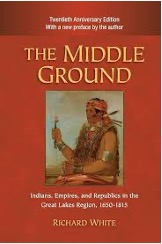 The Middle Ground: Indians, Empires and Republics in the Great Lakes Region, 1650-1815 by Richard White
The Middle Ground: Indians, Empires and Republics in the Great Lakes Region, 1650-1815 by Richard White
An acclaimed book and widely acknowledged classic, The Middle Ground steps outside the simple stories of Indian-white relations – stories of conquest and assimilation and stories of cultural persistence. It is, instead, about a search for accommodation and common meaning. It tells how Europeans and Indians met, regarding each other as alien, as other, as virtually nonhuman, and how between 1650 and 1815 they constructed a common, mutually comprehensible world in the region around the Great Lakes that the French called pays d’en haut. Here the older worlds of the Algonquians and of various Europeans overlapped, and their mixture created new systems of meaning and of exchange. Finally, the book tells of the breakdown of accommodation and common meanings and the re-creation of the Indians as alien and exotic. First published in 1991, the 20th anniversary edition includes a new preface by the author examining the impact and legacy of this study.
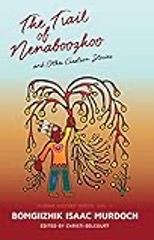 The Trail of Nenaboozhoo and Other Creation Stories by Bomgiizhik (Isaac Murdoch), edited by Christi Belcourt
The Trail of Nenaboozhoo and Other Creation Stories by Bomgiizhik (Isaac Murdoch), edited by Christi Belcourt
Nenaboozhoo, the creator spirit-being of Ojibway legend, gave the people many gifts. This collection of oral stories presents legends of Nenaboozhoo along with other creation stories that tell of the adventures of numerous beloved animal spirits. The Trail of Nenaboozhoo is a book of art and storytelling that preserve the legends of the Anishinaabe people. Each story is accompanied by strikingly beautiful illustrations by revered Indigenous artists Isaac Murdoch and Christi Belcourt.
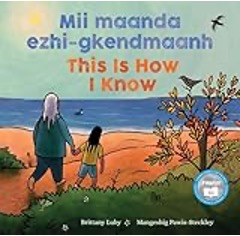 This is How I Know : A Book About the Seasons / Mii Maanda Ezhi-Gkendmaanh: Niibing, Dgwaagig, Bboong, Mnookmig Dbaadjigaade Maanpii Mzin’igning by Brittany Luby; pictures by Joshua Mangeshig Pawis-Steckley; translated by Alvin Ted Corbiere and Alan Corbiere
This is How I Know : A Book About the Seasons / Mii Maanda Ezhi-Gkendmaanh: Niibing, Dgwaagig, Bboong, Mnookmig Dbaadjigaade Maanpii Mzin’igning by Brittany Luby; pictures by Joshua Mangeshig Pawis-Steckley; translated by Alvin Ted Corbiere and Alan Corbiere
In this lyrical story-poem, written in Anishinaabemowin and English, a child and grandmother explore their surroundings, taking pleasure in the familiar sights that each new season brings. We accompany them through warm summer days full of wildflowers, bees and blueberries, then fall, when bears feast before hibernation and forest mushrooms are ripe for harvest. Winter mornings begin in darkness as deer, mice and other animals search for food, while spring brings green shoots poking through melting snow and the chirping of peepers. Brittany Luby and Mangeshig Pawis-Steckley have created a book inspired by childhood memories of time spent with Knowledge Keepers, observing and living in relationship with the natural world in the place they call home ― the northern reaches of Anishinaabewaking, around the Great Lakes.
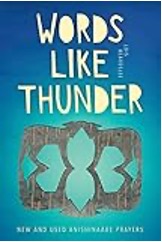 Words Like Thunder: New and Used Anishinaabe Prayers by Lois Beardslee
Words Like Thunder: New and Used Anishinaabe Prayers by Lois Beardslee
Words like Thunder: New and Used Anishinaabe Prayers is a collection of poetry by award-winning Ojibwe author Lois Beardslee. Much of the book centers around Native people of the Great Lakes but these poems carry resonance and relevance for contemporary Indigenous people worldwide. Beardslee tackles contemporary topics like climate change and socioeconomic equality with a grace and readability that empowers readers and celebrates the strengths of Indigenous peoples.
Other Resources
”Indigenous Sovereignty” (Traverse City International Affairs Forum) May 2024 presentation by Matthew L. M. Fletcher, Harry Burns Hutchins Collegiate Professor of Law, University of Michigan Law School
”Grand Traverse Band Seeks Its Day in Court for Theft of Reservation Lands” (Traverse City Record-Eagle) by Patti Brandt Burgess and Sierra Clark
“The Legacy of Michigan’s Native Boarding Schools—and How Tribes are Reclaiming What Was Lost” (Stateside, Michigan Public Radio)
